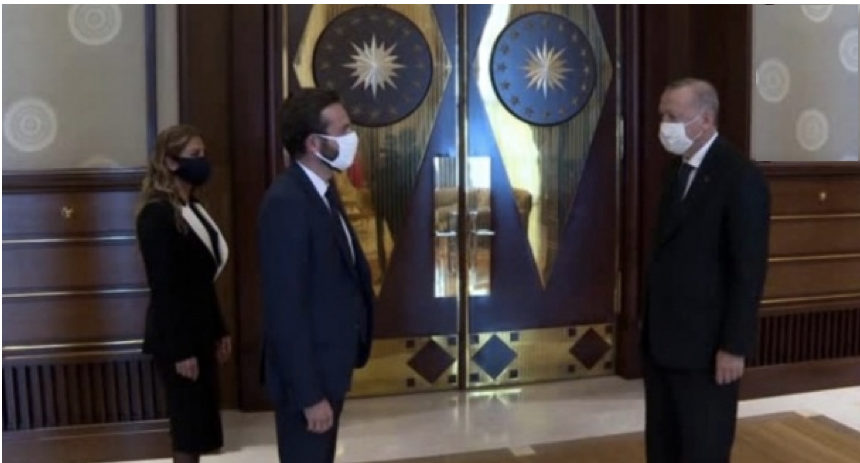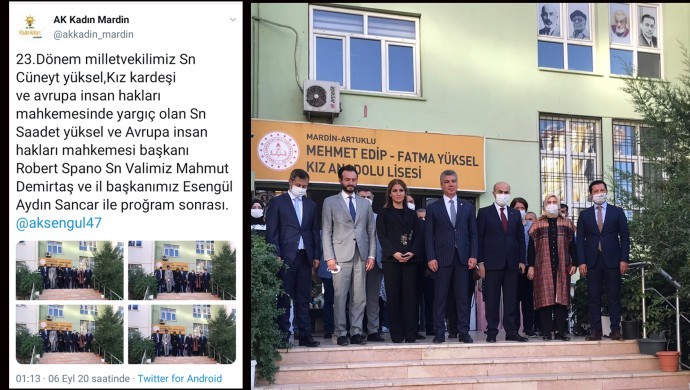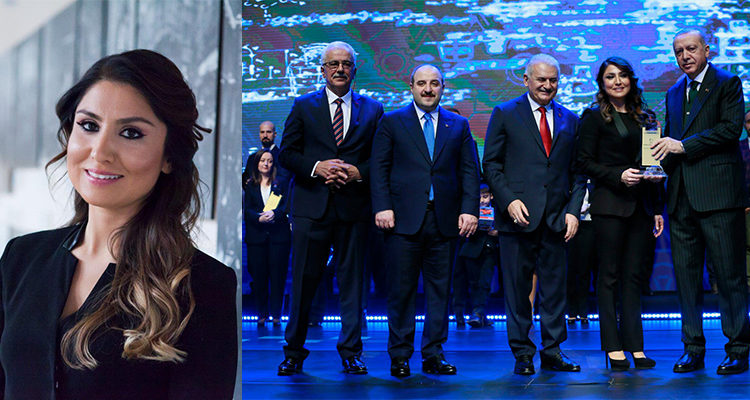Levent Kenez/Stockholm
The European Court of Human Rights (ECtHR), in a decision announced on Tuesday, ruled that Turkey had violated the fundamental rights of a well-known journalist and ordered the country to pay damages to her. The judge representing Turkey on the court, known for her affiliation with the ruling party, annotated the decision, defending the rulings of the politicized local courts under the government’s total control.
Seventy-seven-year-old Turkish journalist Nazlı Ilıcak was detained on July 26, 2016 and arrested on July 29. Her pretrial detention was extended several times. In 2017 a prosecutor demanded an aggravated life sentence for Ilıcak for allegedly supporting a coup attempt on July 15, 2016. Meanwhile, the Constitutional Court rejected Ilıcak’s individual application relating in particular to her rights to liberty and security and freedom of expression. On November 4 2019 an İstanbul court sentenced Ilıcak to eight years, nine months in prison for voluntarily aiding and abetting a terrorist organization without being a member of it, releasing her on probation in consideration of the time she had spent in pretrial detention.

The ECtHR found that there had been a violation of Article 5 § 1 of the European Convention on Human Rights (ECHR), which concerns the right to liberty and security. The court said there had been no plausible reason to suspect Ilıcak of committing the offenses of belonging to a terrorist organization or of attempting to overthrow the government or of hindering its functioning, noting that her writings on which the charges against the applicant and her detention had been based concerned matters of public interest relating to facts and events that were already known.
The court also ruled that there was a violation of Article 10, which regulates freedom of expression. The court also found that the pretrial detention imposed on Ilıcak constituted an “interference” with her right to freedom of expression. The court claimed that the interference had not been prescribed by law.
The only judge who did not agree with these decisions was unsurprisingly Saadet Yüksel, the judge who has represented Turkey since 2019.
Nordic Monitor previously reviewed the cases in which Yüksel dissented from majority opinions in which the applicants were political critics of President Recep Tayyip Erdoğan, taking an explicit stance in line with local Turkish courts. Among these applicants were the co-chairman of a pro-Kurdish opposition party, Selahattin Demirtaş, businessman Osman Kavala and journalists Kadri Gürsel and Ahmet Şık. As a side note, on December 3 the Council of Europe’s Committee of Ministers adopted an interim resolution “strongly urging” Turkish authorities to assure the immediate release of the imprisoned Demirtaş. Moreover, the Council of Europe said it would launch disciplinary action against Turkey for refusing to free Kavala.
Yüksel’s partly dissenting opinion in the Ilıcak ruling (in French only):
In her partly dissenting opinion on the ruling, Yüksel wrote that the pretrial detention imposed on Ilıcak was justified under Article 5 § 1. Contrary to her colleagues, Yüksel agreed with the domestic authorities, who had “plausible reasons” for suspecting Ilıcak of having committed offenses that required pretrial detention.
The ECtHR indicated that it could not be considered acceptable for Turkish authorities in the present case to have based their accusations of terrorist activities merely on the applicant’s work as a journalist in certain media outlets and in particular on her tweets expressing doubts about the possible perpetrators of the attempted coup. However, Yüksel argued that Ilıcak’s tweets went beyond the legitimate activity of a journalist. According to Yüksel, if one takes into account the fact that the tweets were published at the very moment when the attempted coup took place, the way in which the applicant worded her tweets is also an important factor that the ECtHR should have taken into account. She defended Turkey’s Constitutional Court judgment against Ilıcak since the court rightly focused its analysis on the applicant’s tweets and took into account the specific time at which they were published.
The only decision of the court that Yüksel agreed with was that there had been no violation of Article 5 § 4, ruling that the length of proceedings before the Constitutional Court was plausible.
Yüksel was recently at the center of harsh criticism during an official visit to Turkey in September 2020 by her boss and president of the ECtHR Robert Spano. Spano was the first ECtHR president to pay an official visit to Turkey, the government of which is party to more than 16 percent of the cases before the Strasbourg court. Spano and Yüksel met with President Erdoğan behind closed doors at his presidential palace.
Those who expected Spano would give a strong message to top officials that Turkey must implement European court judgments and respect the rule of law were disappointed. Spano made courtesy visits and received an honorary doctorate from Istanbul University, which has fired scores of academics in a massive crackdown since 2016, in a ceremony in which students and journalists were not allowed to participate upon Spano’s request.

Chastised for legitimizing Erdoğan’s unchecked rule by human rights defenders, Spano was also criticized for coming under the influence of Yüksel. Apart from honoring İstanbul University, where Yüksel was working before being elected to the ECtHR, Spano surprisingly traveled to Yüksel’s hometown of Mardin, a city in southeastern Turkey, and met Yüksel’s family members including her brother and former lawmaker for the ruling Justice and Development Party (AKP) Cüneyt Yüksel. Spano drew ire from the Turkish opposition after posing for pictures with members of the AKP. A photo shared on Twitter by the AKP women’s branch in Mardin was immediately deleted following a flurry of criticism. Spano visited the governor of Mardin, who was at the time acting mayor of the city, the elected mayor of which from the pro-Kurdish Peoples’ Democratic Party (HDP) was ousted by the government in 2019.

It is still unclear why Spano dedicated time to visiting Yüksel’s hometown during his official visit to Turkey. French daily Le Monde claimed that Yüksel and Spano are close friends, implying that their relationship is more emotional than professional.
Press release for the Ilıcak judgment issued by the ECtHR:












